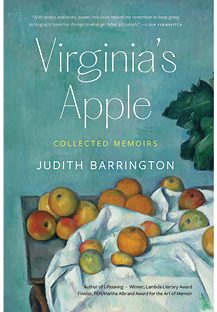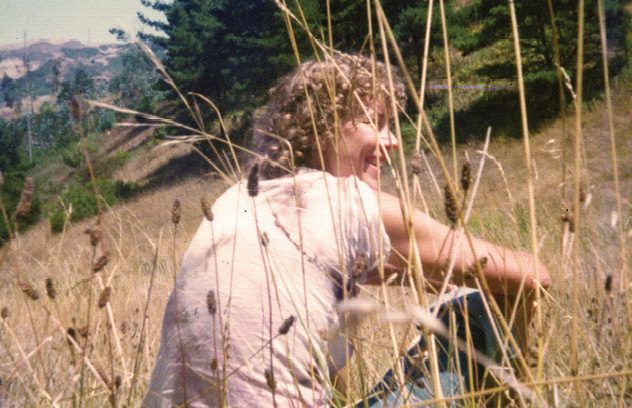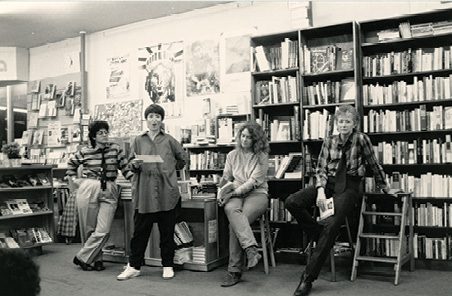
There is a gorgeous moment in Judith Barrington’s new book where she helps Adrienne Rich into a hot tub. It’s a vulnerable moment between two women, just one of many in Barrington’s collection of linked essays. Each written to stand alone, together the fourteen short memoirs offer an exhilarating ride through second wave feminist London in the 1960s and ’70s, as well as providing highlights from the influential women’s movement in the Pacific Northwest during the ’80s and ’90s.
I’ve been a fan of Barrington’s writing for decades. Not just that, I’ve been a fan of the woman herself. During the late 1990s and early 2000s, I lived in Portland, Oregon, where Barrington still lives with her longtime partner, Ruth Gundle. They are two pillars of the Portland writing scene and have dedicated themselves to nurturing women writers. They cofounded Soapstone women writers’ retreat and Flight of the Mind writing workshops. Gundle founded the feminist publisher The Eighth Mountain Press. Barrington is the author of five poetry collections, two poetry chapbooks, an award-winning memoir, and a bestselling text on writing literary memoir.
Barrington turns eighty this year. The essays collected in Virginia’s Apple were written over several decades; however, they do not encompass the author’s entire life. Instead they are linked thematically, a mosaic portrait of a young woman coming into her own physically and sexually, going from sexual naivete to short-lived hetero marriage to lesbian Casanova. The author’s physicality is an important element of these stories, and it will help readers to imagine Barrington as a younger woman: six feet tall, rangy, handsome yet not masculine, a flirty glint in her eye.
Barrington writes openly about the lust and longing between herself and her many lovers—the desire they felt for one another fueled their movement and vice versa. Reading about Barrington’s adventures made me wistful for a time when people tumbled in and out of bed together instead of taking a thousand selfies. She and her comrades spent their time imagining and creating the world they wanted to live in, not as virtual reality, but as a messy, invigorating lived experience. They careered around London full of possibility, as in this scene from the essay “Imagine”:
Inside my purple mini, the space was mine and mine alone; my energy filled it up and pressed outward against the window as I sang along with John Lennon’s “Imagine.” I burned rubber on the corners, floored the accelerator, and hurled the little car into every straight as if it were an extension of my own body sprinting towards the unknown. I didn’t know what kind of world I wanted to dream up, but I felt delirious listening to John’s version.

In the heady days of the early 1960s, Barrington discovered feminism and was just starting to admit to herself that she was a lesbian. At this crucial moment, she experienced a terrible loss. Her parents were aboard a cruise ship off the Canary Islands when it caught fire. Not enough lifeboats were able to reach the terrified passengers as the ship burned, and many of them drowned. Barrington’s book-length memoir, Lifesaving (The Eighth Mountain Press, 2000), dealt with this time in her life. In Virginia’s Apple, she does not reprise the details of the ship disaster, but her grief threads through the essays, illustrating how a major loss informs an entire life. “I didn’t know it would never go away, no matter how deeply I lusted, no matter how desperately I loved,” she writes.
This tension between the grief she was trying to run away from and the unknown world she was running to is propulsive. Just after her parents died, she began a torrid affair with her uncle’s second wife, Nicolette, who was hated by the family for breaking up the uncle’s first marriage. Nicolette took the grieving Judy—as Barrington was known then—into her care. Nicolette turned out to be an alcoholic beset by money problems. But the allure of illicit sex and romance overshadowed the dysfunction for a good year, until Barrington fell in love with another woman.
As she came out of the shadows, Barrington embraced the women’s liberation movement. She describes attending consciousness-raising groups with dozens of young women like herself:
Week after week, we took long breaths and with our hearts beating in our ears, we translated our lives into rambling narratives. We were learning how to listen to one another in a new way—a way that encouraged us to understand things we’d rarely thought and never heard said aloud. Those meetings—now half a century ago—have merged into one long piece of music sometimes moving along repetitively like a Philip Glass symphony with many different melodies merging into one another, and occasionally erupting into a storm of percussion like Verdi’s Dies Irae crashing through the room.
In 1975 Barrington followed a lover to the US. They promptly fought, and Barrington set off to explore the country herself, eventually landing in the then (as now) lesbian Shangri-la of Portland, Oregon. About her first impressions of Portland, Barrington writes, “What with lesbian bars and women-only concerts and softball teams, it was almost possible to live in an entirely female world,” adding, “my accent drew women to me: dykes in tight T-shirts at the Rising Moon asked me to repeat ordinary figures of speech.” Soon women in tight jeans were lining up to teach her to play pool, and she “fell into one-night stands or two-week flings.”

Until she met Ruth. “Beds” charts the course of Barrington’s big love story, suffused with, as she writes, “a golden light.” Theirs is a love for the ages, two women from different countries who become compatriots in a world they create with each other.
It is into this world that Adrienne Rich entered. By the late ’70s, Barrington had begun publishing her own poems. When, in 1981, she and Ruth got word that the esteemed US poet and lesbian feminist icon was coming to town to give a reading, they invited Rich to stay with them. Rich accepted, and what came to pass was an exquisitely tender visit.
The desire they felt for one another fueled their movement and vice versa.
The three women had a wonderful first dinner together, with delicious food and conversation. Before Rich went to bed that night, she asked about a hot tub. She suffered from rheumatoid arthritis and warm water was good therapy. Barrington knew just the place, and the next day she took Rich to a wellness center in the city. Women’s-only hours were available, no bathing suit required. Rich disrobed and tried to get into a tub, but because of her disability, she struggled. Barrington stripped down to help the famous poet in.
“Holding her firmly, I felt her ribs pressing into my forearms,” Barrington writes. “A moment later, she tipped forward and her whole weight, small and frail as it was, pressed into me, skin to skin. I felt a sudden rush of compassion. Hardly wanting to release her, I set her down gently and felt my legs grow hot, as if they were blushing for my whole self.”
I found this chapter incredibly moving. Rich, who was born in 1929, has been an influence to generations of feminists, lesbians, and writers. Her books launched me on my feminist path. Her poems have shaped my ways of looking at the world. Learning that Barrington, born in 1944, had been similarly shaped by Rich’s work a few decades earlier than me gave me, born in 1969, such hope. I love to think of the resounding influence of Rich’s work, as when Barrington describes reading Rich’s essays and poems and feeling “the molecules in my body shifting uncomfortably, trying to rearrange themselves.” I know exactly the feeling she describes.
The title essay occurs later in the book, when Barrington and Ruth visit Virginia Woolf’s home in Sussex. While I won’t give away specifics, I will say that the juicy forbidden fruit is an apt theme for Barrington’s collection. Reading this book, I was in awe of how she takes on complex topics like consent, power imbalances, disability, the gender spectrum, and sexual desire with a plainspoken vulnerability. The book is full of nuance, clearly written by a mature author whose self-compassion and compassion for others drives her craft. I found the book to be a welcome tonic to our current harsh, didactic approach to complicated social issues. Just as Adrienne Rich was a literary beacon for many of us, so too is Judith Barrington a master of how to write eloquently, with tenderness and humor, about the complexity of a sexy, daring, creative life. D

